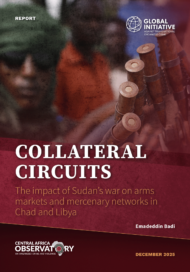
01 Dec 2025
Collateral circuits
CA-Obs
Senior Fellow, Global Initiative against Transnational Organized Crime
Emadeddin Badi is a Senior Fellow at the Global Initiative Against Transnational Organized Crime (GI-TOC), where he conducts and leads research on illicit economies and their intersection with conflict dynamics, political transitions, and governance challenges across North Africa and the Sahel. His portfolio includes confidential assessments, policy briefs, and in-depth analyses related to smuggling, trafficking, and the political economy of transnational organized crime. He also contributes regularly to both public reporting and private advisory work as part of GI-TOC’s North Africa and Sahel Observatory.
With over a decade of experience in governance, post-conflict stabilization, civil-military coordination, hybrid security structures, security sector reform, and transnational organized crime, Emad has demonstrated expertise in building and leading research teams in politically sensitive and hard-to-access environments. He has coordinated field research operations involving human-source and open-source intelligence (OSINT) collection, analytic oversight, and the development of research processes in fragile settings. In addition to his institutional work, he advises private companies on political risk and due diligence in volatile and transitional contexts. He continues to undertake fieldwork across North Africa as part of his research engagements.
Emad has consulted for a wide range of organizations, including the European Union, the United Nations Department for Political and Peacebuilding Affairs (UN DPPA), the United States Institute of Peace (USIP), the Geneva Centre for Security Sector Governance (DCAF), and the United Nations Development Programme (UNDP). He has contributed to multi-country research initiatives focused on conflict transitions, security provision, and the structure of illicit economies – often combining qualitative fieldwork, conflict analysis, and stakeholder engagement to inform international policy.
In 2023, he served as Military Adviser to the United Nations Independent Fact-Finding Mission to Libya, supporting investigations into the conduct, structure, and command hierarchies of state and non-state armed actors. His responsibilities included analyzing patterns of violence, assessing weapon systems, and military tactics, determining linkages between militias and state institutions, and contributing to accountability processes under international humanitarian law.
Earlier in his career, Emad supported the conflict-sensitive implementation of UNDP’s Stabilization Facility for Libya, managed municipal-level peacebuilding grants, and advised on decentralization and governance reforms. He also produced in-depth policy research for institutions such as Chatham House, Geneva Call, and DCAF, focusing on non-state armed actors, the use of sanctions for stabilization, and the application of international humanitarian law in asymmetric conflict settings.
Emad’s work has been widely published by institutions including the Brookings Institution, Carnegie Endowment for International Peace, Chatham House, the Middle East Institute, Small Arms Survey, European Council on Foreign Relations, War on the Rocks, and World Politics Review. He is a contributing author to Violence and Social Transformation in Libya(Hurst/Oxford University Press, 2023) and has authored several peer-reviewed academic articles. He frequently appears as a commentator on international media platforms and has been quoted by numerous international outlets on issues related to geopolitics, security, migration, and organized crime. Additionally, Emad regularly presents and lectures on his areas of expertise to governmental, NGO, and professional audiences.
He is an Expert at the Centre on Armed Groups and a Fellow of the United Nations Alliance of Civilizations (UNAOC). His previous fellowships include the European University Institute’s School of Transnational Governance and the Middle East Institute’s Counterterrorism and Extremism Program. He is also a nonresident senior fellow with the Atlantic Council’s Middle East Programs, advising on U.S. and European policy toward Libya and the wider region.
Emad holds an MSc in Violence, Conflict and Development from SOAS, University of London, and two bachelor’s degrees from the University of Essex and the University of Tripoli. He is fluent in Arabic, English, and French.